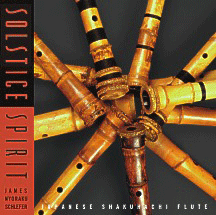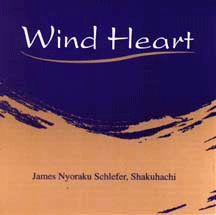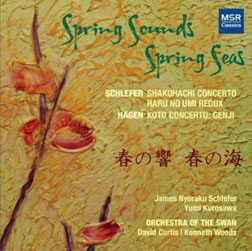
|
 S-S2d. SPRING SOUNDS / SPRING SEAS S-S2d. SPRING SOUNDS / SPRING SEAS
James Nyoraku Schlefer’s Haru no Umi Redux is a new version of the seminal 1929 work, Haru no Umi, by Michiyo Miyagi, one of the first pieces to successfully bring Western musical influences to Japanese instruments. In Schlefer’s three-movement Shakuhachi Concerto for solo shakuhachi, strings, harp and percussion, the shakuhachi serves as both soloist and team player, alternately in concert or in conflict with the orchestra. Daron Hagen’s Koto Concerto: Genji is based on an 11th century tale. The five movement work brings out the koto's wealth of sound and beauty as it interacts with the orchestra.
Performers:
JAMES NYORAKU SCHLEFER shakuhachi
YUMI KUROSAWA 20-string koto
ORCHESTRA OF THE SWAN
DAVID CURTIS conductor
KENNETH WOODS conductor
"Despite his Brooklyn origins, James Nyoraku Schlefer is a Grand Master of the shakuhachi (one of only a small number of non-Japanese to hold that title). He studied in Japan and New York. Schlefer’s Haru no Umi Redux (2011) is his own take on a Japanese melody of that name composed in 1929 by koto master Michiyo Miyago. The opening phrases, in Japan, now denote the New Year’s holiday. It is a delightful piece, and it certainly sounds as though the Swan Orchestra enjoyed playing it. The recording is topflight.
"Once one has heard the plangent, evocative sound of a shakuhachi, it is not easily forgotten. Schlefer’s Shakuhachi Concerto begins in decidedly Debussian fashion (it is marked “Hazy awareness,” which certainly implies an Impressionist basis). Scored for solo shakuhachi, strings, harp, and percussion, it boasts a long, slow first movement. The mix of West and East is impressively managed in terms of musical language: Schlefer will begin a melody in decidedly occidental manner before adding an orientalist twist as the theme progresses. The second movement, “Crystal Solitude,” does not quite convey the yearning, lonely quality this instrument is normally associated with, despite beginning with a solo cadenza for the solo instrument, but it is atmospheric nonetheless, and the idea of a loss of solid pulse continues throughout most of the rest of the movement. The finale, a rondo, moves the goalposts substantially, juxtaposing varied, rhythmic sections against the delicacy of the preceding two movements. The Swan Orchestra comes into its own here; Schlefer is a fine player throughout, and his own best advocate. This is memorable music in fine performances.
"Daron Hagen’s operas have served him in good stead when it comes to his Koto Concerto, “Genji” (2011). The “Genji” title refers to the 11th-century Tale of Genji. The music is certainly descriptive of the five scenes it seeks to depict from Genji’s life (Genji was son of the Emperor, relegated to commoner status). His adventures are described in the story; Hagen takes five scenes and explores them as psychological situations. The first movement, “Cicada Shell,” seems to speak more of film music than opera, though. The solo violin (accompanied by koto) that opens the second movement, “Falling Flowers,” seems strangely to refer to Rimsky’s Scheherazade. The “Maiden on the Bridge” speaks of oriental delicacy and is superbly played by the soloist, Yumi Kurosawa, while “Floating Bridge of Dreams” is a more virtuoso affair (for both soloist and orchestra)."
This review by Colin Clarke originally appeared in Issue 36:2 (Nov/Dec 2012) of Fanfare Magazine |
CD |
$15.00 |
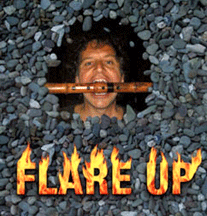
|

S-S2c. FLARE UP
"Deep within there is a scary place, a brilliant place.
When touched, the emotions flare up, if only for an instant.
. . . Like a flame that can scorch or heal, it is both humbling
and inspiring."
The latest recording by shakuhachi Grand Master James Nyoraku
Schlefer. Traditional honkyoku include the Futaiken version of
"Tsuru no Sugomori," (remarkable for its extensive
use of Tamane) the Nezasaha version of "Koku" (with
improvised Shirabe) the beautiful but obscure piece "Banji,"
and the classic "Jinbo Sanya." Kinea Seiho's emotional
and technical tour-de-force "Ichijo" and two of Schlefer's
original works ("Brooklyn Sanya", and the title cut
"Flare Up") complete this excellent new CD.
|
CD |
$16.50 |
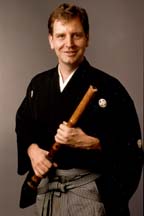 James Nyoraku Schlefer is a leading performer and teacher of shakuhachi in New York City. He received the Dai-Shi-Han or Grand Master's Certificate in 2001, and in 2007, he received a second shi-han license, this one from Yoshio
Kurahashi and the Mujuan Dojo in Kyoto. In Japan he has worked with Aoki Reibo, Yokoyama Katsuya, Yoshinobu Taniguchi, and Mitsuhashi Kifu. His primary teacher in New York was Ronnie Nyogetsu Seldin. Schlefer holds a Master's degree in Western flute & musicology from Queens College (CUNY) and currently teaches music history courses at the City University of New York. He has four solo recordings, Wind Heart (which traveled 120,000,000 miles aboard the Space Station MIR) Solstice Spirit (1998,) Flare Up (2002,) and In The Moment (2008.) His music has been featured on NPR's All Things Considered.
James Nyoraku Schlefer is a leading performer and teacher of shakuhachi in New York City. He received the Dai-Shi-Han or Grand Master's Certificate in 2001, and in 2007, he received a second shi-han license, this one from Yoshio
Kurahashi and the Mujuan Dojo in Kyoto. In Japan he has worked with Aoki Reibo, Yokoyama Katsuya, Yoshinobu Taniguchi, and Mitsuhashi Kifu. His primary teacher in New York was Ronnie Nyogetsu Seldin. Schlefer holds a Master's degree in Western flute & musicology from Queens College (CUNY) and currently teaches music history courses at the City University of New York. He has four solo recordings, Wind Heart (which traveled 120,000,000 miles aboard the Space Station MIR) Solstice Spirit (1998,) Flare Up (2002,) and In The Moment (2008.) His music has been featured on NPR's All Things Considered.

